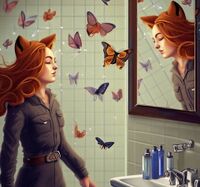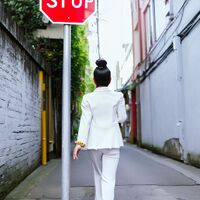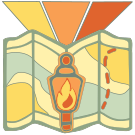Lens of Attention: Presence
 | |
| Lens: Presence | |
|---|---|
| Beacons | Attention |
| Landmarks | Explore Presence While Walking Notice Your Wandering Mind Use Sounds to be Present |
Lenses, in the context of the Beacons of Everyday Enlightenment represent more specific concepts and practices through which we can understand the rich meaning of each Beacon. There are Primary Lenses, which are the most commonly understood and most robust meditative concepts, and there are Other Lenses which are a collection of other closely related ideas for that Beacon.
Presence is about being fully here and now, not lost in thoughts of the past or future. It involves directing your full attention and consciousness to the activities and experiences of the current moment. Cultivating presence is key to living each moment to its fullest.
Landmarks
The Realms of Everyday Enlightenment each have some noticeable Landmarks which show the likely alignment someone within that Realm has with each of the Beacons and their various Lenses. These Landmarks are things that need to be noticed and explored in the context of those Lenses and Beacons. And then through working on the Trails and Guides these Landmarks will serve as markers toward the next Realm where new Landmarks await.
Landmarks of Enrollment
Landmark: Notice Your Wandering Mind
 | |
| Landmark: Notice Your Wandering Mind | |
|---|---|
| Beacons | Attention |
| Realms | Enrollment |
| Lenses | Presence |
| Guides | Brushing Your Teeth |
The Landmark of Notice Your Wandering Mind asks whether you can notice when your mind tends to wander off in different directions.
Review these questions to see if you have fully explored this Landmark and are ready to move on.
Landmark Lookouts:
- Notice Your Wandering Mind: Are you able to notice times when your mind wanders?
- A Wandering Mind is Different: Can you feel that a wandering mind is different than a tranquil mind or a focused mind?
- It's Possible to Let the Mind Return: When your mind does wander, do you notice the moment when it comes back from that distant thought, and back into The Now?
The idea here is to just practice basic Attention and Presence during something you do every day.
- Pick up your toothbrush and squeeze a strip of toothpaste onto it.
- Turn on the tap and wet the brush, your daily dental hygiene routine is now a mindfulness exercise.
- As you start brushing, pay attention to where your thoughts wander off.
- Are you thinking about your meetings? Your grocery list? Or maybe an argument from last night?
- Each time you catch your mind straying, gently guide it back to the sensation of brushing.
- Focus on the taste of the toothpaste, the feel of the bristles against your teeth and gums, the sound of brushing.
- Once you're done brushing, rinse your mouth and your brush.
- Clean up your space, put everything back where it belongs, and stand still for a moment, taking in the quiet.
- Use this small window of time twice a day to practice focusing and reigning in your wandering mind.
Landmark: Use Sounds to be Present
 | |
| Landmark: Use Sounds to be Present | |
|---|---|
| Beacons | Attention |
| Realms | Enrollment |
| Lenses | Presence |
| Guides | Sounds |
| Trails | Learn About Attention |
The Landmark of Use Sounds to be Present asks about your ability to notice how listening to sounds can quickly bring your wandering mind back to your present experience.
Review these questions to see if you have fully explored this Landmark and are ready to move on.
Landmark Lookouts:
- Notice Your Wandering Mind: Are you able to notice times when your mind wanders?
- Experiment with Sounds and Presence: Can you identify the experience of sounds pulling you back into the present and keeping you in the present?
- Sounds as Anchors: Do you notice and sense that as long as you listen to sounds in the present moment your mind is less likely to stray?
Quite often you'll find a great variety of sounds outside, which is the perfect time to use these concepts.
- You're outside, maybe walking your dog, or sitting in your backyard. It's a regular part of your day.
- As you're enjoying your surroundings, let your mind wander freely. Let it daydream.
- Amidst the daydreaming, bring your attention to the sounds around you.
- The distant sound of traffic, the rustling leaves, the birds singing - tune into one of these sounds, whichever one you like.
- Each time a particular sound catches your attention, let it pull you out of your daydream, anchoring you back to reality.
- Acknowledge the thought or daydream that was interrupted by the sound, let it go, then return to listening.
- Continue this practice of allowing sounds to interrupt your daydreams, noting the shift in your attention.
- Reflect on how the sounds around you can serve as tools to bring you back to the present moment.
- Take a few more moments and listen intently to one of the sounds. Notice that as long as you listen, your mind is less likely to drift.
- Incorporate this practice into your day to cultivate the habit of using sounds as anchors to the present moment.
Landmarks of Engagement
Landmark: Explore Presence While Walking
 | |
| Landmark: Explore Presence While Walking | |
|---|---|
| Beacons | Attention |
| Realms | Engagement |
| Lenses | Presence |
| Guides | Walking |
The Landmark of Explore Presence While Walking shows some perceptions shifts that provide deeper understanding of how to Experience the Now, especially relating to how the present moment is the only moment that ever exists in consciousness.
Review these questions to see if you have fully explored this Landmark and are ready to move on.
Landmark Lookouts:
- Typical Perception of the Present: Can you observe how we typically experience The Now as a few minutes of time (rather than as an instant) - connected to what happened just before, and what will probably happen next?
- Explore Perception of the Present: Are you able to regularly experience the Present as independent from the past and future - as if it was the only snapshot of your life that exists?
While walking, whether in a park, on the way to the subway, around your house, or at work, you can experiment with your perception of The Now.
- Typical Walking - As you move around, notice how easy it is to think of this moment as a journey that connects us to where we've just been, and where we're going next. Things around us are in motion, and are changing the whole time, and we are navigating through our world.
- Conveyor belt - Shift your perception to the sense that you are standing still, and the world is moving. Perhaps the world is a treadmill, and you are merely "keeping up" with its motion. Or perhaps you are standing still and the world is morphing or warping in a way that brings things closer to you or farther from you.
- Timeless walking - Notice a fixed marker such as a light pole, and as you walk towards it, shift your perception to the sense that you are in fact not walking at all, because without any "time" beyond the now, you will simply always be as close to that marker as you are, and there is no change in that distance, because each moment exists independently, and each "new now" simply exists with its own facts about reality.
- Timeless Stairs - do the same exercise when on stairs, as it is even easier. Whenever you take a step, pause for just a split second with one foot on the new step and one foot on the previous step. Notice that you have arrived at this location, and this is the present moment. After each step note that you are in the present moment. There is no journey, just present moments. Once you've learned to see this, learn to see it without any mental or actual pauses in your steps.
Landmarks of Enrichment
Landmarks for this Realm (Enrichment) will be added here when those pages are created.
Shadows
The Beacons of Everyday Enlightenment provide powerful guidance through the Realms. The Lenses represent different facets of those Beacons, which provide further focus or illumination of that Beacon. On the other hand, Lenses are also accompanied by two types of Shadows which tend to obscure our journey to Enlightenment. The first kind of Shadows are the Looming Shadows, which are the obvious opposite of a given Lens, and should hopefully be easy to avoid and train against once we understand them. The second kind are the Flickering Shadows, which could be confused with the associated Lenses, because they are quite similar to the Lens, while actually being a harmful or negative counterpart. Both types of Shadows should be understood in the context of the Lens and Beacon, and reviewed periodically to ensure our view is not obscured. Within the Lens of Presence, we are reminded to be fully here and now.
- Looming Shadow - Absence, the opposite of Presence, is being mentally lost in thoughts of the past or future, not being grounded in the present moment. As we develop our Presence, we should see our Absence diminish.
- Flickering Shadow - Obsession with the Now, is a misguided approach to Presence. Being in the present is not about ignoring what we call the past and future but is rather about gaining a better understanding of the nature of reality, existence, and time itself. When obsessing about the present prevents us from gaining those insights, it has become a negative pattern that needs to be broken.
Resources
- How Present-Moment Awareness Can Make Life More Meaningful - "Presence involves a simple yet incredible shift—from the ordinary state of mind wandering to bringing our attention to the experience of what is happening right now. You can make this shift anytime, anywhere."
